
Is Self-Care Selfish? | Psychology Today
The need for self-care
- With heightened rates of anxiety, depression, and substance abuse, self-care is needed more than ever these days.
- Unlike self-indulgence, self-care involves deliberate attention, discipline, and effort.
- Cultivating mindfulness is an empirically based self-care tool associated with individual and relational well-being.

Self-care is a popular topic these days. It seems like wherever we turn someone is espousing the importance of engaging in it regularly. And it’s not surprising since we all seem to need it more than ever during these challenging times.
But if you’re like many people, you may feel guilty doing it, perhaps equating it with selfishness. After all, with so many problems in the world—not to mention young kids to raise, aging parents to care for, friends in need, and struggling members in our community—you may be thinking, who has the time or energy to focus on themselves. Isn’t that incredibly irresponsible?
The answer is a flat-out no. Self-care isn’t irresponsible. In fact, self-care is incredibly responsible.
And it is especially needed now at a time when people’s mental health is greatly suffering. In fact, one report from the CDC found nearly one-third of respondents were experiencing anxiety or depression, more than a quarter were feeling stressed, and over 10 percent reported increased substance abuse.
As we’ve all heard while flying, we need to remember to put on our oxygen masks first before helping others. And not waiting for when we are in a state of emergency or crisis mode. But remembering to oxygenate ourselves regularly by doing things repeatedly that refuel us daily is important. Only then can we put our best selves out there in service of others.
Self-care versus self-indulgence
Perhaps others of us may have no problem practicing so-called “self-care” but may be engaging in specific behaviors that aren’t beneficial to us, and perhaps are even detrimental to our well-being.
For example, we may think self-care is about lounging around drinking wine every evening and delving into a box of dark chocolates, while binging on back-to-back Netflix series. If that’s your thing, no judgments here. (We, too, love wine, decadent desserts, and movies!)
However, while these enjoyments may make you feel good in the moment, they are not likely to provide long-term benefits. Akin to the pleasure versus positivity difference we wrote about in an earlier post, many people conflate self-care with self-indulgence.
What exactly then is self-care? And how do we go about it?

The science of self-care
Self-care involves deliberate attention, discipline, and effort. It’s focusing our energy on specific actions that can develop into healthy habits. It takes work and isn’t easy.
It’s engaging in healthy behaviors like physical exercise, practicing mindfulness, learning a new skill, and developing our character strengths and virtues.
It’s much easier to plop onto the couch with a bag of chips rather than lace up our sneakers for a brisk walk outdoors when we are feeling stressed. Or, quickly come up with an excuse after snapping at our partner, rather than taking a breath, apologizing, and practicing changing our reactions into more thoughtful responses.
And who of us hasn’t fretted away countless amounts of time scrolling through our social media feeds? And how do we usually feel afterward? Not so good, right? What if, instead, we would have carved out time to finally start that engrossing novel we’ve been wanting to read or to dust off that musical instrument that we’ve been meaning to practice?
Cultivating a mindfulness practice
One empirically based self-care tool that can help us manage our attention and make better choices across all aspects of our lives is starting a mindfulness practice.
John Kabat-Zinn, the founder of mindfulness-based stressed reduction, defines mindfulness as “the awareness that emerges through paying attention on purpose, in the present moment, and non-judgmentally to the unfolding experience moment by moment.”
By helping us become more aware of our actions, mindfulness can help prevent us from defaulting into automatic pilot and engaging in unhealthy habits that can damage our health, and even derail our relationships.
Much of the mindfulness research has focused on improving individual well-being, for example by helping us, say, make better food choices. Surprisingly, not much research has focused on its benefits to relational well-being. Until now.
A number of recent studies show promising effects that a mindfulness practice can have on the quality of our relationships because it can help us become “nonreactive,” and “act with awareness.”
A recent study in the Journal of Social and Personal Relationships measuring these two facets of mindfulness found they are especially important for sustaining healthy relationships. In particular, “nonreactivity” for overall relationship quality, and “acting with awareness” for women’s sexual satisfaction.
Further, another study reported that couples who engaged in a mindfulness intervention for two weeks experienced a stronger connection than those who engaged in relaxation exercises.
Mounting evidence supports that individual and relational well-being alike is action oriented. Unlike relaxation. Self-care isn’t the same as sitting back. It takes work.
In sum, while it’s definitely not easy, it pays off in the long run when we practice effortful and mindful self-care, which consists of flexing our physical, emotional, and mental muscles. We become more resilient, strengthen our relationships, and stretch ourselves into becoming the best versions of ourselves.
ReferencesCzeisler, Mark É et al. “Mental Health, Substance Use, and Suicidal Ideation During the COVID-19 Pandemic – United States, June 24-30, 2020.” MMWR. Morbidity and mortality weekly report vol. 69,32 1049-1057. 14 Aug. 2020, doi:10.15585/mmwr.mm6932a1
Kabat-Zinn, J. (2003). Mindfulness-based interventions in context: Past, present, and future. Clinical Psychology: Science and Practice, 10(2), 144–156. https://doi.org/10.1093/clipsy. bpg016
Karremans, J.C., Kappen, G., Schellekens, M. et al. Comparing the effects of a mindfulness versus relaxation intervention on romantic relationship wellbeing. Sci Rep 10, 21696 (2020). https://doi.org/10.1038/s41598-020-78919-6
McGill, Julianne M., Burke, Leah K., & Adler-Baeder, Francesca . (July 30, 2020). The dyadic influences of mindfulness on relationship functioning. The Journal of Social and Personal Relationships, 1-11, https://doi.org/10.1177/0265407520944243)








